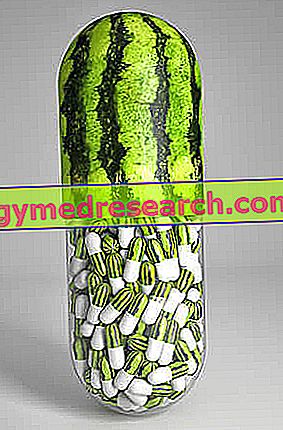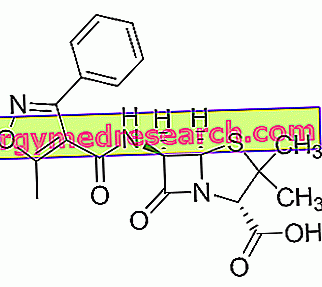Generality
L-citrulline, or more simply citrulline, is a ubiquitous alpha-amino acid, present both in the human organism and in many plant species from which it is extracted.

However, even the human organism constitutes an excellent source of citrulline, especially the intestine - which provides more than 90% of the organic content of citrulline - and the liver, whose synthesis is achieved through the urea cycle .
Due to the appreciable endogenous biosynthesis, citrulline is classified among the conditionally essential amino acids.
In fact, there are particular conditions in which the need for citrulline rises to such levels that the body is no longer able to meet these needs. These are conditions such as short bowel syndrome, inflammatory bowel disease, malabsorption syndromes, urea cycle disorders and liver diseases, all of which make the dietary intake of citrulline essential.
Although not participating in protein synthesis processes, citrulline plays a key role in the organic economy, for:
- Antioxidant activity;
- Cardio- and vaso-protective activity;
- The detoxifying activity;
- Arginine precursor activity.
These properties will influence the clinical use of citrulline.
Indications
Why is citrulline used? What is it for?
For several years now, citrulline has been actively used in both clinical and sports settings.
In addition to the antioxidant activity, others have been added, of different nature, which have facilitated the spread of citrulline supplements.
To witness the enormous interest of the scientific community towards this amino acid derivative, there is the growing number of studies on orinitina, published by the most prestigious international universities.
At the moment, with the due doubts and with many fields still to be clarified, citrulline would seem useful in:
- Treat and prevent hypertension;
- Improve the metabolic framework during metabolic syndrome;
- Reduce cardiovascular risk;
- Improve protein metabolism during particular conditions, such as sarcopenia, autoimmune diseases and inflammatory bowel diseases;
- Treating some urea cycle disorders;
- Delaying complications of degenerative diseases, such as multiple sclerosis.
The aforementioned activities would be joined by others, still very controversial and not fully corroborated by noteworthy scientific evidence, such as:
- Performance improvement activity;
- The beneficial action during erectile dysfunction.
Property and Effectiveness
What benefit has Citrulline shown during the studies?
Given the impressive amount of scientific work currently published, it is not easy to summarize all the biological potential of citrulline, supported by strong evidence.
In principle, however, it is possible to clearly describe some of the main activities of this molecule.
Citrulline and antioxidant activity
Initially observed on plants, in particular on watermelon (fruit with a high citrulline content), the antioxidant action is probably the first biological activity studied for this amino acid.
The intake of citrulline, but actually also of watermelon and watermelon seeds, would seem, both in experimental models and in clinical trials, to protect the organism from the damaging action of reactive oxygen species.
Through complex molecular mechanisms, many of which are not fully characterized, citrulline could act as a direct scavenger towards oxygen free radicals, protecting macromolecules, such as DNA and membrane lipids, from structural and functional damage.
The antioxidant activity would seem to be jointly responsible for the cardioprotective action of this molecule.
Citrulline and hypertension
It is known as one of the most important vasodilatory agents, therefore endowed with natural antihypertensive activity, and nitric oxide.
Many studies have shown that the production of nitric oxide can be supported by the adequate presence of Arginine.
However the integration with Arginine, due to the numerous metabolic processes to which this amino acid is subjected following its intake, would not seem to determine an appreciable increase in the concentrations of this molecule.
According to very recent studies, the use of citrulline could exert an antihypertensive action, acting precisely on this path.
Following the ingestion of citrulline, both in experimental models and in some clinical trials, an increase in plasma concentrations of arginine and an increased activity of the endothelial enzyme responsible for the synthesis of nitric oxide would have been observed.
All this would result in a citrulline-induced vasodilation, potentially valuable in hypertension.
Citrulline and erectile dysfunction
Along the lines of what has just been described for hypertension, the use of citrulline, precisely through the induction of nitric oxide, could also play an important role in the management of conditions such as erectile dysfunction.
Although there is no unanimity, with regard to the clinical efficacy of citrulline, in some clinical trials, still very small in number, the daily use of citrulline would have led to an improvement in the clinical picture in patients suffering from mild erectile dysfunction.
To learn more: Citrulline and Erectile Dysfunction.
Citrulline and protein synthesis
Some studies, mostly of an experimental nature, would have shown the anabolic activity of citrulline.
Despite what has been widely publicized, the anabolic and anticatabolic activity of citrulline would have been observed only in some particular conditions such as:
- sarcopenia;
- Cachexia;
- Inflammatory bowel disorders;
- Malabsorption syndromes.
Under these conditions the use of citrulline would have on the one hand improved the hormonal profile on the other hand increased the rate of protein synthesis.
Citrulline and sport
The beneficial properties of citrulline in sports would also in this case be attributed to the increase in plasma concentrations of arginine, following the ingestion of citrulline.
The increased bioavailability of arginine could determine:
- An increase in critical power;
- A general improvement in performance;
- A reduction in recovery times;
- The reduction of markers of muscle damage following intense physical training.
Instead, the anabolic potential for muscle mass, and more precisely protein synthesis, of this amino acid would remain unclear. To learn more: Integration of Citrulline in Sports Practice
Doses and method of use
How to use citrulline
The dose of citrulline most used in the various studies, both athletic and clinical, is that of 3 grams per day, although there are jobs with higher dosages.
However, the presence of a suggested dose is not sufficient to identify an optimal dose, which may vary from user to user depending on the needs, physical characteristics and physio-pathological conditions.
Side effects
The use of citrulline, even at high doses, is generally well tolerated.
Gastrointestinal reactions such as nausea, diarrhea, vomiting and abdominal cramps have been described following the use of disproportionate doses of this supplement.
Contraindications
When should citrulline not be used?
The use of citrulline is contraindicated in subjects hypersensitive to the active ingredient or allergic to the source of extraction.
Pharmacological Interactions
What drugs or foods can modify the effect of citrulline?
There are currently no known pharmacological interactions between citrulline and other active ingredients.
Precautions for use
What do you need to know before taking citrulline?
The use of citrulline supplements, for clinical purposes, should always be evaluated with your doctor.
Given the lack of studies concerning the long-term safety profile of this amino acid, the use of citrulline supplements is generally contraindicated during pregnancy and in the subsequent breastfeeding period.



